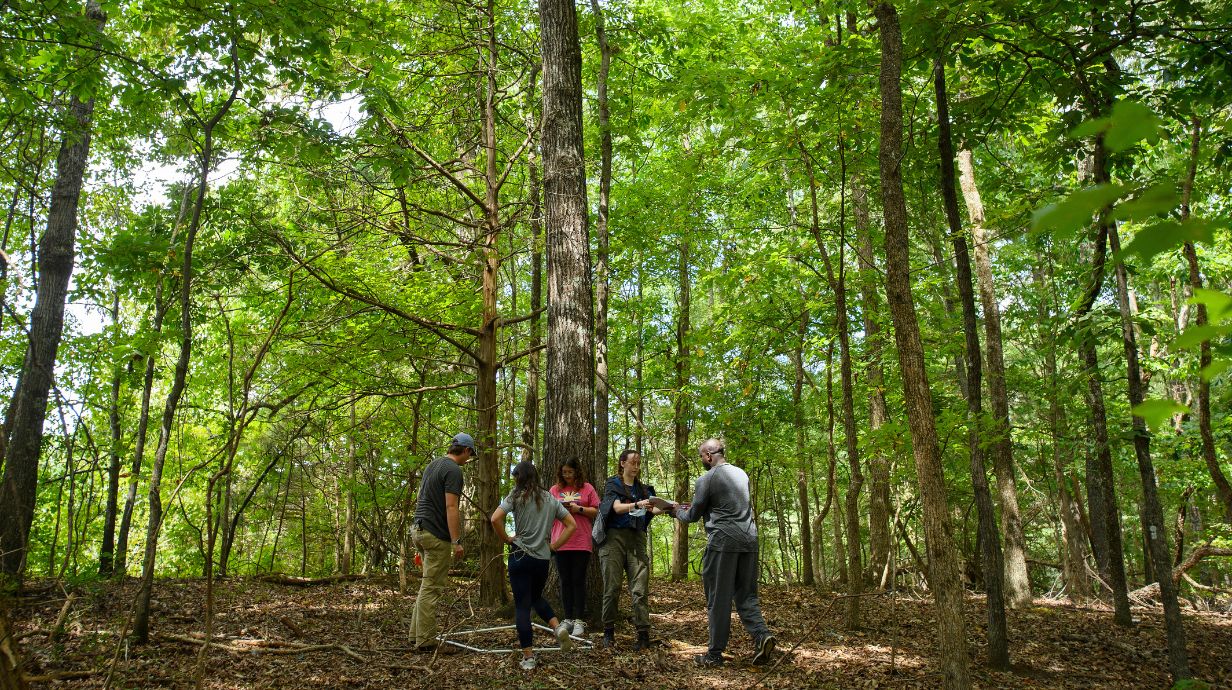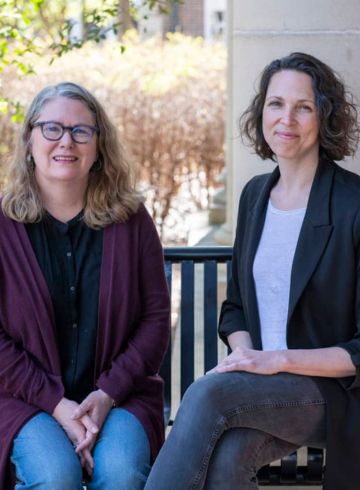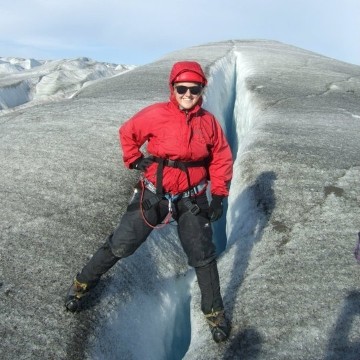Environmental Studies, B.A.
Prepare for careers dedicated to solving environmental challenges and building a sustainable, just, and climate-resilient future.
- Home
- Academic Programs
- Bachelor of Arts in Environmental Studies

About the Bachelor of Arts in Environmental Studies
After nearly two decades of offering an Environmental Studies minor, the College of Liberal Arts now offers the interdisciplinary Bachelor of Arts in Environmental Studies. Students evaluate vital environmental issues of today and learn how to become part of the range of innovative responses to current and future environmental challenges.
Through coursework in the natural sciences, social sciences, and humanities, students build a comprehensive understanding of the scientific, social, and cultural dimensions of humanity's relationship to the environment. They gain knowledge of:
- Environmental science, including the ecological, biological, chemical, atmospheric, and geological systems involved in climate change, species conservation, and pollution mitigation.
- The political, social, and psychological dimensions of human-environmental interactions and policy design.
- The ethics of human-environment interactions and the role of the environment in human history, philosophy, religion, literature, and art.
Beyond the classroom, our students gain hands-on experience through internships and may also earn credits through fieldwork and study abroad.
On this Page…
Program Information
Degree
B.A. in Environmental Studies
Required Credit Hours
120
Program Type
Major
Minor
Program Location
School
Academic Requirements
Find out about credit hour and course requirements from the 2025-26 academic catalog.
Students in the College of Liberal Arts earning the B.A. degree have a common set of 48-50 hours of general education. The specific courses taken to complete the categories of general education may differ between majors.
Categories of General Education:
- First Year Writing I, II
- English Literature Survey
- Modern or Ancient Language
- History
- Additional Humanities
- Fine or Performing Arts Appreciation
- Mathematics
- Social Sciences
- Natural Sciences
To see the details for these general education requirements, visit the UM online catalog or the degree sheet attached at the top of this webpage.
Students majoring in Environmental Studies complete 38 hours of coursework. At least 16 of these credit hours can also be counted toward completion of the College of Liberal Arts general education requirements in humanities, social sciences, and natural sciences. The major consists of 10 hours of required introductory courses, 9 hours of core electives, 3 hours of internship, a 1 hour capstone course, and 15 hours of electives. Students must also complete a minor.
Required Introductory Courses:
- Envs 101: Introduction to the Environmental Humanities
- Anth 105: Introduction to Environment and Society
- Natural Sciences: students select one of the following introductory biology courses:
- Bisc 111: The Environment: Integrated Exploration (lab included) OR
- Bisc 104 & 105: Inquiring into Life: The Environment (and lab) OR
- Bisc 162 & 163: Biological Sciences II (and lab) [recommended for students interested in taking advanced Bisc courses for the major]
Core Electives. One course from each categories:
- Humanities core electives:
- Phil 245/PPL 345: Environmental Ethics
- Env 405: Nature Writing
- Social science core electives:
- Anth 330: Environmental Anthropology
- Anth 360/Geog 360: Political Ecology
- Anth 417: Environmentalism: Society, Politics, Law
- Anth 420: Environmental Archaeology
- PPL 381: Global Environmental Issues
- Psy 365: Environmental Psychology
- Natural Science core electives:
- Envs 333/Bisc 322: General Ecology
- Envs 333/Bisc 413: Conservation Biology
- Chem 210: Environmental Chemistry I
- Chem 202: Environmental Chemistry II
- Geol 104: Environmental Geology: Hazards
- Geol 105: Environmental Geology: Resources
Additional requirements:
- Envs 385: Internship in Environmental Studies
- Environmental Studies Capstone Colloquium (1 credit hour)
Approved List of Electives (15 hours):
- Anth 104/Geog 101: Introduction to Human Geography
- Anth 330: Environmental Anthropology
- Anth 338/Geog 338: Food, Place, and Power
- Anth 350: Ice Age North America
- Anth 360/Geog 360: Political Ecology
- Anth 362/Geog 362/Soc 362: Sustainable Development
- Anth 417: Environmentalism: Society, Politics, Law
- Anth 420: Environmental Archaeology
- Bisc 220: Natural Resource Management
- Bisc 318: Botany
- Bisc 320: Introductory Marine Biology
- Bisc 321: Introduction to Aquatic Biology
- Bisc 322: General Ecology
- Bisc 323: Biology of Invasive Species
- Bisc 329: Biology of Fishes
- Bisc 334: Ornithology
- Bisc 337: Introductory Entomology
- Bisc 342: Plant Diversity
- Bisc 345: Symbiosis: From Parasitism to Mutualism
- Bisc 349: Biology of Sharks and Their Relatives
- Bisc 350: Mammalogy
- Bisc 413: Conservation Biology
- Bisc 443: Ecology of Plant Communities of Mississippi
- Bisc 445: Introduction to Coral-Reef Ecology
- Bisc 448: Tropical Studies in Biology
- Bisc 502: Mycology
- Bisc 504: Biometry
- Bisc 505: Aquatic Microbiology
- Bisc 510: Theoretical Ecology
- Bisc 512: Animal Behavior
- Bisc 514: Population Genetics
- Bisc 522: Microbial Ecology
- Bisc 524: Aquatic Botany
- Bisc 525: Conservation and Restoration Ecology
- Bisc 528: Conservation Physiology
- Bisc 530: Advanced Field Study in Ecology
- Bisc 535: Plant-Insect Interactions
- Bisc 540: Chemical Ecology
- Bisc 550: Biological Oceanography
- Bisc 554: Ecological Physiology
- Bisc 568: Infectious Disease Ecology
- C E 471: Environmental Engineering
- Chem 103: Survey of Chemistry I
- Chem 105: General Chemistry I
- Chem 201: Environmental Chemistry I
- Chem 202: Environmental Chemistry II
- Econ 406: Natural Resource Economics
- Eng 388: Studies in British Environmental Lit
- Eng 389: Studies in American Environmental Lit
- Eng 391: Environmental Genres and Forms
- Eng 405: Nature Writing
- Eng 458: Southern Environmental Literature
- Eng 494: Special Topics in Environmental Studies
- Eng 495: Literature and the Nonhuman
- Envs 311: Study Abroad—Humanities and the Environment
- Envs 312: Study Abroad—Social Sciences and the Environment
- Envs 313: Study Abroad—Natural Sciences and the Environment
- Envs 321: Special Topics in Humanities
- Envs 322: Special Topics in Social Sciences
- Envs 323: Special Topics in Natural Sciences
- Envs 333: Natural Sciences for Envs minors
- Envs 385: Environmental Studies Internship
- Envs 397: Topics in Environmental Studies Abroad
- Envs 399: Special Topics in Environmental Studies
- Fr 589: The Environment in French Literature
- G St 391: Women, Gender, and the Environment
- G E 470: Intro to Geographic Information System
- Geol 104: Environmental Geology – Hazards
- Geol 105: Environmental Geology – Resources
- Geol 107: Introduction to Oceanography
- Hst 355: Water in the Middle East
- Math 115: Elementary Statistics
- Math 120: Quantitative Reasoning
- Phil 345/PPL 345: Environmental Ethics
- Phil 348/Rel 390: Nature and Environment in Asian Religion
- Phcl 347/547: Introduction to Environmental Toxicology
- Phcl 349: Specialized Topics in Environmental Health
- Phcl 381/581. Introduction to Toxicology
- PH 300: Environmental Health
- PPL 345/Phil 345: Environmental Ethics
- PPL 381: Global Environmental Issues
- Psy 202: Statistics for Behavioral Sciences
- Psy 350: Ecopsychology and International Youth
- Psy 365: Environmental Psychology
- Rel 390/Phil 348: Nature and Environment in Asian Religion
- S St 536: The Southern Environment
Students minoring in Environmental Studies complete 18 hours of courses.
- Envs 101: Humanities and the Environment or Envs 301: Advanced Humanities and the Environment
- 15 credit hours of approved electives, with a minimum of 3 hours in the social sciences and a minimum of 3 hours in the natural sciences.
Humanities Category
- Eng 388: Studies in British Environmental Lit
- Eng 389: Studies in American Environmental Lit
- Eng 391: Environmental Genres and Forms
- Eng 405: Nature Writing
- Eng 458: Southern Environmental Literature Writing
- Eng 494: Special Topics in Environmental Studies
- Eng 495: Literature and the Nonhuman
- Envs 311: Study Abroad - Environment & Humanities
- Envs 321: Special Topics in Humanities
- G St 391: Women, Gender, and the Environment
- Hst 355: Water in the Middle East
- Hst 453: Environmental History of the South
- Phil 345: Environmental Ethics
- Rel 390/Phil 348: Nature and Environment in Asian Religion
- S St 536: The Southern Environment
Natural Sciences Category
- Bisc 104: Inquiry into Life: The Environment
- Bisc 162: Biological Sciences II
- Envs 313: Study Abroad: Environment & Natural Science
- Envs 323: Special Topics in Natural Sciences
- Envs 333: Natural Sciences for Envs Minors
- Bisc 220: Natural Resource Management
- Bisc 318: Botany
- Bisc 320: Introductory Marine Biology
- Bisc 321: Introduction to Aquatic Biology
- Bisc 322: General Ecology
- Bisc 329: Biology of Fishes
- Bisc 334: Ornithology
- Bisc 337: Introductory Entomology
- Bisc 342: Plant Diversity
- Bisc 345: Symbiosis
- Bisc 349: Biology of Sharks and Their Relatives
- Bisc 350: Mammalogy
- Bisc 413: Conservation Biology
- Bisc 443: Ecology of Plant Communities of MS
- Bisc 502: Mycology
- Bisc 510: Theoretical Ecology
- Bisc 512: Animal Behavior
- Bisc 522: Microbial Ecology
- Bisc 524: Aquatic Botany
- Bisc 525: Conservation and Restoration Ecology
- CE 471: Environmental Engineering
- Chem 103: Chemistry for Non Majors OR Chem 105: Chemistry for Majors
- Chem 201: Environmental Chemistry I
- Chem 202: Environmental Chemistry II
- Geol 104: Environmental Geology - Hazards
- Geol 105: Environmental Geology - Resources
- Geol 107: Introduction to Oceanography
- Phcl 347/547: Intro to Environmental Toxicology
- Phcl 349: Specialized Topics in Environmental Health
- Phcl 381/581: Introduction to Toxicology
Social Sciences Category
- Anth 104/Geog 101: Intro to Human Geography
- Anth 105/Geog 105: Intro to Environment and Society
- Anth 319: Environmental History of the South
- Anth 320: Archaeozoology: Animal Use in History
- Anth 330: Environmental Anthropology
- Anth 331: American Indians and the Natural World
- Anth 338: Food, Place, and Power
- Anth 360: Political Ecology
- Anth/Geog/Soc 362: Sustainable Development
- Anth 417: Environmentalism: Society, Politics, Law
- Econ 406: Environmental Economics
- Envs 312: Study Abroad - Environment & Social Science
- Envs 322: Special Topics in Social Sciences
- PPL 381: Global Environmental Issues
- Psy 350: Ecopsychology and International Youth
- Psy 365: Environmental Psychology
- Soc 411: Environment, Technology, and Society
Enhance Your Academic Experience
According to national surveys, employers are more likely to hire students who have:
- had professional internships,
- worked with people from diverse backgrounds on community service,
- collaborated with peers on projects,
- taken multiple courses with significant writing,
- produced a senior project or thesis, and
- studied abroad.
These experiences are the core of the liberal arts skills of thinking, communicating, interpersonal skills, and understanding the world around us. Showcase and enhance these skills in an internship opportunity for that first step into the professional world.
Environmental Studies students combine coursework with hands-on, experiential learning opportunities. Environmental studies students have had internship experiences with a broad range of organizations, including UM Office of Sustainability, Gulf Restoration Network, The Nature Conservancy, Citizens Climate Lobby, The Black Earth Institute, Energy and Natural Resources Division of the MS Development Authority, Delta Wind Birds, Homeplace Pastures Farm, Farmstead Florals, NIHT, Inc. (carbon credit sales), Mississippi Farm to School Network, and Oxford Community Market.
Stay Up-to-date on the Latest!
Want to hear about the latest ENVS events and job postings? Join our ENVS listserv by emailing us below.ENVS 385: Internship in Environmental Studies
The Internship in Environmental Studies (ENVS 385) provides a unique opportunity to gain valuable pre-professional training through hands-on experience in environment-related work outside of the traditional classroom.
ENVS 385 is a Z-graded, three-credit-hour course that may be repeated with approval. Envs majors are required to complete at least one internship during their studies. Envs minors are encouraged but not required to complete an internship for elective credit (however internship credit will not count toward a specific requirement in the humanities, natural sciences, or social sciences).
Requirements and Process for Enrolling in and Receiving Credit for an ENVS Internship
Students enroll in ENVS 385 in the semester after completion of the internship. The steps are as follows:- Before you begin the internship: You and the outfit you’re interning for will fill out the internship agreement form and submit it to Envs for approval prior to the start of the internship. Eligible internships must include a significant environmental component and entail at least 120 hours of internship work. All internships must be pre-approved by Envs before the start of the internship; any arrangement not pre-approved will not be eligible for credit.
- During your internship: You and the outfit you’re interning for must ensure that your work fulfills the terms of the internship outlined in the internship agreement form.
- At the conclusion of the internship: Your supervisor at the interning site must complete the Final Intern Evaluation Form. A “unsatisfactory” assessment constitutes grounds to deny eligibility for enrollment in or credit for ENVS 385.
- Within a year of completing your internship: Enroll in ENVS 385 and complete two independent projects during the semester in which you are enrolled: an original 6-8 page (~1800-2400 word) reflection analyzing your internship experience and an original 10-page (~3000 word) academic research paper on a larger environmental issue toward which your internship work contributed (or was at least relevant). If applicable, students may also submit any work they produced during the internship as further evidence of the writing ability and/or analytical skills they employed as an intern.
- Upon successful completion of the requirements for ENVS 385 you will receive Envs credit for your internship.
Learning Objectives
The purpose of ENVS 385 is to integrate academic learning with the practical experience that students gain during an internship. The internship itself constitutes the practical component of the course; reflection upon the experience and the synthesis of theory and practice take place during the academic phase, in ENVS 385. Academic credit is granted for completing a series of academic assignments that are based on the internship experience.
Upon successful completion of ENVS 385, students will have developed:
- a reflective and critical understanding of what it means to work in an environment-related field
- the ability to communicate in writing their understanding of an environmental issue related to the internship experience
Before starting the internship
You and the outfit you’re interning for will fill out the internship agreement form below and submit it to Envs for approval prior to the start of the internship. All internships must be pre-approved by Envs before the start of the internship; any arrangement not pre-approved will not be eligible for credit.
Internship Agreement Form
At the conclusion of the internship
Your supervisor at the interning site must complete the Final Intern Evaluation Form below. A “unsatisfactory” assessment constitutes grounds to deny eligibility for enrollment in or credit for ENVS 385.
Find Out About Student Opportunties in the Office of Sustainability
There’s never been a better time to get involved as a student on campus with sustainability initiatives. Whether you are a freshman, a senior, or graduate student, there are opportunities for you.

A Word from Our Directors
"The Environmental Studies program at UM prepares students to become innovators and leaders in an effort to meet environmental challenges head-on. We believe it’s crucial to train students for careers that help create sustainable, just, and climate-resilient communities in Mississippi and beyond. As the shift to sustainability continues to become a major driver of economic growth, technological innovation, and social policy, we aim to ensure that University of Mississippi students are prepared to succeed in the new climate economy."
Dr. Cristin Ellis and Dr. Deanna Kreisel
Co-Directors of the Environmental Studies Program
Affiliated Faculty
Jeffery Bednark
- Instructional Assistant Professor of Psychology
John Brewer
- Professor of Biology
James Cizdziel
- Chair and Professor of Chemistry and Biochemistry
Cristin Ellis
- Associate Professor of English and Co-Director of the Interdisciplinary Minor in Environmental Studies
Andy Harper
- Director of Media & Documentary Projects and Associate Professor of Practice
Jason Hoeksema
- Professor of Biology, Associate Chair and Graduate Program Coordinator
Erik Hom
- Associate Professor of Biology
Vivian Ibrahim-Dinius
- Associate Professor of History and Director of the Office of National Scholarship Advisement
Laura Johnson
- Professor of Psychology
Deanna Kreisel
- Associate Professor of English and Co-Director of the Interdisciplinary Minor in Environmental Studies
Scott Mackenzie
- Director of Undergraduate Studies and Associate Professor of English
Marcos Mendoza
- Associate Professor of Anthropology and Associate Chair
Timothy Menzel
- Instructional Assistant Professor of Biology
Aimee Nezhukumatathil
- Professor of English and Creative Writing
Michel Ohmer
- Assistant Professor of Biology
Karen Raber
- Distinguished Professor of English
Ishana Ratan
- Assistant Professor of Political Science
Jason Ritchie
- Associate Professor of Chemistry & Biochemistry and Stefani-Miller Chair for Teaching Excellence
Nora Sylvander
- Croft Assistant Professor of Anthropology and International Studies
Jesse Tune
- Associate Professor of Anthropology and Director, Center for Archaeological Research
Zachary Vereb
- Assistant Professor of Public Policy Leadership
Shaila Wadhwani-Greenhalgh
- Instructional Assistant Professor of Liberal Arts
Peter Zee
- Associate Professor of Biology
Where are our Environmental Studies graduates working?
Here is a sample of positions held by alumni of the Environmental Studies minor.
| Law, Policy, and Government | Environmental Research |
|---|---|
| Legislative Policy Fellow, US Senate | Researcher, Hawaii Institute of Marine Biology |
| Environmental Policy Consultant, US House of Representatives | Researcher, Savannah River National Lab |
| Environmental Planner, New Orleans Regional Planning Commission | Researcher, Auburn University College of Forestry, Wildlife, and Environment |
| Assistant City Planner, City of Starkville | Wildlife Biologist, MS Dept of Wildlife, Fisheries, and Parks |
| Senior Attorney, FL Dept of Environmental Protection | Conservationist, MS Museum of Natural Science |
| Energy Transactional and Regulatory Attorney, Balch & Bingham LLP | |
| Environmental Education and Advocacy | Private Sector Work |
| Director, Cedar Crest Environmental Education Center | Investor Relations, GRC SinoGreen Fund |
| Environmental Educator, South Carolina Dept of Natural Resources | Environmental Sustainability Program Manager, Cox Enterprises, Inc |
| Environmental Organizer, Green Corps | Water Resources Engineer, Gresham Smith |
| Program Coordinator, Working Landscapes | Program Director, Yellow Dog Flyfishing |
| Horticulturist, AquaTerra Designs, Inc | |
Alumni Spotlight

Terrius Harris
Terrius Harris (B.A. French, B.B.A. General Business, B.G.S. General Studies '19) was one of four US students as Planet Forward's Senior Correspondent at the 2018 UN-FAO Committee on World Food Security in Italy. He earned a M.A. in Indigenous People’s Law from Oklahoma and a M.A. in Public Policy, Energy, and Environmental Policy from Chicago. Harris is an Obama Scholar chosen for his work empowering Indigenous-led, community-based, socio-economic development and environmental conservation.

Shelley Clark
Shelley Clark (B.A. International Studies and French '11) interned with the Gulf Restoration Network. She earned her law degree from Pace, a top law school for environmental law, and a dual-degree M.A. of Environmental Management from Yale. While at Pace, she interned at the NY Dept of Environmental Conservation where she assisted with enforcement against violations of conservation law in tidal wetland areas. Clark is now an Associate Attorney with Epstein Holtzapple Christo LLP in California.

Neal McMillin
Neal McMillin (B.A. in Economics and Southern Studies '14) studied alternative energy sources in Scotland and enrolled in a field trip-based biology course on the lower Mississippi River. He earned a M.A. in Marine Affairs from Washington then a policy fellowship from National Oceanic and Atmospheric Admin with MS Senator Roger Wicker's office. McMillin is the Dir. of Federal Affairs for Louisiana's Dept. of Energy and Natural Resources, where he contributes to energy and coastal policy.

Sara Douglass Lynch
Sara Douglass Lynch (B.A. Biology '14) was active with Campus for Clean Energy and MS Alumni and Students for Sustainability (MASS), a statewide network for sustainable living. After graduation, she was a Sustainability Fellow at UM where she helped UM achieve bronze level Bicycle Friendly University. She earned graduate degrees in City and Regional Planning and in Civil Engineering from Georgia Tech and is now a Transportation Planner/Engineer at Arcadis.

Alex Borst
Alex Borst (B.A. International Studies '17) interned with the MS Sustainable Agriculture Network. Through an apprenticeship found on GoodFoodJobs, he discovered his career path with a rural development nonprofit focused on food supply chains in North Carolina. He continued with Happy Dirt to work on projects including a forest trail for children, taste tests of local food in schools, surveying local growers, and creating a documentary of the food chain. Borst is now a Purchasing Manager with Happy Dirt.

Kendall McDonald
Kendall McDonald (B.A. in Public Policy Leadership '15) earned the national Udall award for her dedication to environmental issues. She worked with the UM Office of Sustainability as a student where she championed change agent initiatives such as Eco Reps and the Green Student Intern Program. She joined that office after graduation as a Post-Baccalaureate Fellow, Project Manager, then Associate Director. McDonald is the Development Manager of Memphis Parks for the City of Memphis.
Choosing a Minor
College of Liberal Arts students earning the B.A. degree complete a minor field of study (or double major.) Combine your study of the environment with many other subjects based on your interests and career goals. Here are a few to consider.
UG
Use scientific methods to understand and predict natural phenomena in the world around us.
- Oxford
UG
Learn how to apply science and math to design, construct, operate and maintain solutions to technical problems
- Oxford
UG
Learn to think critically, conduct research, and craft clear, compelling arguments across various media. Majors study literature and creative writing with acclaimed faculty in a town celebrated for its literary culture.
- Oxford
- Booneville
- DeSoto
- Tupelo
UG
Cross disciplines. Connect Ideas. Create Insight.
- Oxford
- Booneville
- DeSoto
- Tupelo
UG
Explore the history, cultures, politics, and economies of the world. Study abroad and develop fluency in one of eight languages.
- Oxford
UG
Understanding political actors and institutions, both domestic and international.
- Oxford
UG
Understand what motivates people and why people behave the way that they do.
- Oxford
- Booneville
- DeSoto
- Tupelo
UG
Examine the dynamics of social interaction and social problems.
- Oxford
- Booneville
- DeSoto
- Tupelo
UG
Strong writers and visual storytellers with a sense of adventure will find a home in our distinguished Bachelor of Arts in Journalism program with its reputation for producing award-winning talent.
- Oxford
- Online
Welcome to the College of Liberal Arts
As Coordinator of Student Recruitment for the College of Liberal Arts, I work with students, and their parents, who are interested in attending UM for their undergraduate degrees. I coordinate personalized visits to our departments, answer questions about the majors and programs in the CLA and handle all recruitment communications from the CLA. Please feel free to send me any questions you may have. It is my job to make sure you have everything you need to make an informed decision on where to spend your college career, and I hope it will be with the College of Liberal Arts at the University of Mississippi!
Annabelle Harris
CLA Coordinator of Student Recruitment
Future CLA Students

College of Liberal Arts Undergraduate Students
We invite future undergraduates to learn about the College of Liberal Arts, the value of the liberal arts education, our programs, career opportunities, and resources to help you succeed. You can also request a personalized degree sheet.
Next Steps
Explore Affordability
We have a variety of scholarships and financial aid options to help make college more affordable for you and your family.
Apply to the University of Mississippi
Are you ready to take the next step toward building your legacy?
